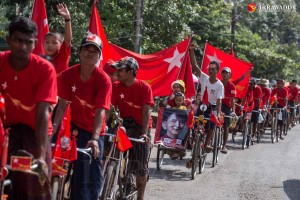Victims’ Voices and Healing a Must for Genuine Reconciliation
By Burma Partnership • December 17, 2015 Much has been made of the series of meetings between Daw Aung San Suu Kyi and several key individuals after the elections, including the current Commander-in-Chief of the Burma Army, Senior General Min Aung Hlaing. But none generated more headlines than the meeting on 4 December, 2015 with retired Senior General Than Shwe, leader of the former military junta and head of state until 2011, purportedly to discuss and ensure a smooth transition of power.
Much has been made of the series of meetings between Daw Aung San Suu Kyi and several key individuals after the elections, including the current Commander-in-Chief of the Burma Army, Senior General Min Aung Hlaing. But none generated more headlines than the meeting on 4 December, 2015 with retired Senior General Than Shwe, leader of the former military junta and head of state until 2011, purportedly to discuss and ensure a smooth transition of power.
Such meetings, while raising eyebrows, are more than just symbolic and should be read in the context of Burma’s troubled past with elections and power transfer. The emphatic victory at the November 2015 polls was similar to the 1990 elections, which later saw the annulment of the results and extension of power by the military.
Seen in this light, these meetings reveal the complexity of the power transfer, the actors that still wield considerable political capital, and the different interests in directing the transition. It is also fair to infer that a relatively seamless power transfer to the incoming National League for Democracy (NLD) Government can be expected, given the apparent endorsement and pledge of support from senior figures from the previous military regime such as Than Shwe.
However, given the national mandate and legitimacy the NLD enjoys after their resounding elections victory, it is somewhat fair and necessary to question at what cost a “smooth” power transfer or sharing will entail, and if certain trade-offs are likely to be made in the process.
Already, a recent series of exposés by Global Witness have highlighted the prominent roles and interests of powerful individuals such as Than Shwe, whose companies operate extensively in Kachin State, a region plagued by ongoing daily military offensives and egregious rights violations, and has resulted in large-scale forced displacement of civilians and a mounting humanitarian crisis. The same continues to occur in Shan State, where active conflict is also often tied intimately to natural resources and extractive industries.
The reports further reveal other political and military elite, army and crony businesses, and even ceasefire groups that operate in a tight nexus of power and interests, which further renders any effort to address the issue politically charged and complex, and a litmus test of the NLD Government’s commitment to a peaceful and equitable Burma.
There are also fears that other broad concessions will be made, such as granting blanket amnesties for past and ongoing rights violations on issues that range from armed conflict, to sexual and gender-based violence and political repression among others. Already, the 2008 Constitution provides such a safeguard, stating that ‘no proceeding shall be instituted against the said Councils (State Law and Order Council and State Peace Development Council) or any member thereof or any member of the government, in respect of any act done in the execution of their respective duties.’
Naturally, there are also related concerns that these political negotiations will result in deals that allow the military to retain a prevailing role in all echelons of society and dominate the key cabinet positions and institutions, which in general remain unaccountable and resistant to reform.
At the same time, judicial independence remains very weak, and cannot effectively contribute towards accountability and non-recurrence. A recent report tabled by the Parliamentary Judicial and Legal Affairs Complaints and Grievances Investigation Committee on 8 December 2015 found that the ‘judiciary remains one of the country’s most corrupt institutions’ and ‘confirmed the existence of a “chain of bribery” in the judiciary, with judges at different levels taking instructions from their superiors and links between supervisory legal staff that often affects the outcome of criminal and civil cases.
Clearly, domestic accountability and justice mechanisms are almost non-existent and do not inspire trust or confidence where they do exist. In confronting these issues, the NLD Government will walk a tightrope in its negotiations with the political and military elite, while at the same time try to find its feet and voice in setting a national policy agenda and embarking on institutional reform efforts, including the security sector. Undoubtedly, these will pose challenging tests to the aim of “national reconciliation,” consistently set out by Daw Aung San Suu Kyi after the elections.
Just as the NLD continues to take pains to dialogue with key players in the military and outgoing government to ensure a smooth transition, concrete measures aimed at establishing a credible justice and accountability process that instills public confidence must also remain at the forefront of the incoming government’s plans. The calls for “national reconciliation” and “forgiveness” must not be an elite project that is trumped by political pragmatism, but must emerge from the will and healing of victims and survivors as well. Any high-level political negotiations must ensure that victims’ voices are not sidelined and that public recognition of the past and ongoing atrocities is not denied. Otherwise, it will allow more injustices to continue and genuine peace and reconciliation will remain far-fetched.
Tags: Daw Aung San Suu Kyi, Global Witness, National League for Democracy, reconcili, Than ShweThis post is in: Blog
Related PostsForeign Secretary meets Aung San Suu Kyi in London
The Elders welcome Myanmar peace conference
Burma: US Should Retain Key Sanctions
Advisory Commission on Rakhine State – A Welcome Investigation into Arakan State’s Human Rights and Humanitarian Crisis
Statement of ARNO on Daw Aung San Suu Kyi’s 21st Century Panglong Convention









 All posts
All posts